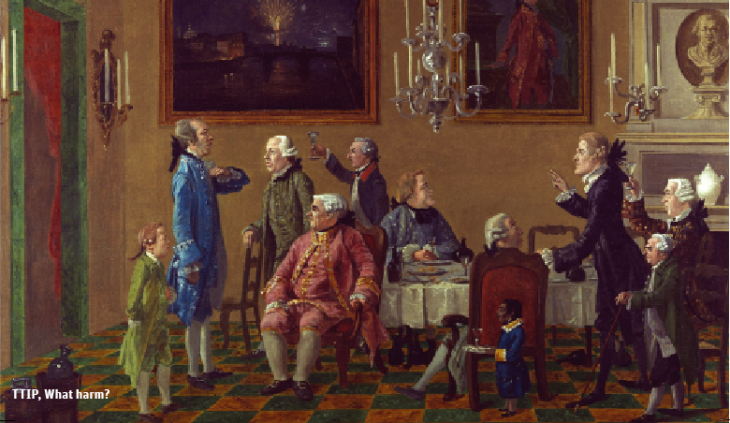By Lynn Boylan, MEP.
I’ve never been one to shy away from criticising the democratic deficit at the heart of the European Union. However, even a critic like me was left speechless with the antics recently in the European Parliament. MEPs were due to vote on June 10th on a report that outlined the Parliament’s position on the current Transatlantic Trade and Investment programme (TTIP) negotiations. Then stroke politics on a European scale kicked in.
This trade agreement if it comes to fruition will be the largest of its kind and will account for 45% of global GDP. It will potentially impact on every aspect of people’s lives, from further liberalisation of public services, to reduced labour conditions, and to a downgrading of environmental and food regulation. The most controversial part of the deal is the inclusion of an Investor State Dispute Settlement (ISDS) mechanism. This allows multinational corporations to sue governments if they feel that a government policy interferes with their profits or their future profits.
Resistance to ISDS is widespread across the EU, especially in countries that have experienced these secret courts. As a result the level of public lobbying before the vote on June 10th was enormous. I, for one, received thousands of emails from Irish citizens encouraging me to vote No to the report. This clearly spooked many MEPs, particularly members of the two largest groups – the Socialists and Democrats, and the European People’s Party – which usually form a majority coalition on most key votes.
There are already many examples of ISDS mechanisms in place and they have led to serious problems. For example there was Veolia’s challenge to the Egyptian government for attempting to raise the minimum wage. Phillip Morris is currently involved in an action against the Australian Government for introducing plain-package tobacco requirements. These cases are settled behind closed doors and there is no right of appeal.
In the days leading up to the Parliament vote, it was clear that neither of the two main political groups could guarantee they could bring their members along to support the report, particularly with the inclusion of ISDS. A hastily arranged dinner in Strasbourg was attended by the President of the Parliament, Martin Schulz (Socialist and Democrats group), the President of the Commission, Jean Claude Juncker (the European People’s Party’s man in the Commission), Martin Weber, Chairperson of the European People’s Party, Gianni Pitella, President of the Socialists and Democrats group, and the Vice-President of the Commission, Frans Timmermans (the Socialists and Democrats group’s man in the Commission). Schulz’s promises of the TTIP vote being in the bag could no longer be guaranteed. Time needed to be bought.
On the eve of the vote, an email was circulated to advise that the vote would now be postponed due to the volume of amendments (over 200) that had been submitted. This was hardly the most robust excuse for an institution that deals with thousands of amendments on a daily basis. However, when you are the President of the Parliament, it’s easy to find a rule to suit your agenda. Later in the evening, another email circulated, advising MEPs that the debate was to be postponed. Heaven forbid that the interested citizens should know which MEPs were not happy with ISDS, TTIP or, indeed, the suspiciously suspended Parliament vote.
Unfortunately this behaviour is not unique and we are set to see more of it. It seems that the cosy dinner between the five movers and shakers of Brussels was not a one off. ‘G5’ as they affectionately refer to themselves meet at least twice a month for dinner to discuss upcoming files and to offset possible difficulties.
It is believed that it was at one of these cosy dinners that they managed to wrangle Jean Claude Juncker out of a possible European Parliament censure. The censure was related to his connection to the ‘LuxLeaks’ corporate-tax-evasion scandal, which happened under his watch as Prime Minister of Luxembourg.
With increasing numbers of people across the EU feeling disconnected from the EU institutions, the idea that all major decisions will come down to five men sitting around a table in a five-star hostelry will do nothing to reassure them. Democracy in the EU, it seems, remains a nice idea. •
